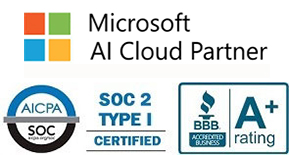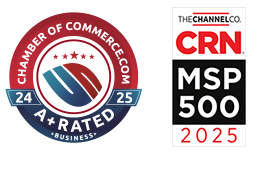IT Consulting | IT Support | Managed Services | New Jersey Computer Support Services

Cybersecurity is no longer just about protecting your own network, it’s about protecting your entire business ecosystem. As companies become more connected and reliant on third-party vendors, supply chain risks are rising fast. These threats are sneaky, damaging, and often overlooked, until it’s too late.
At Integrated Computer Services, we’re passionate about helping businesses stay ahead of emerging threats with cutting-edge, proactive solutions that align with your goals, scale with your growth, and fit your budget. In this article, we’ll break down what supply chain cyberattacks are, why they’re increasing, and, most importantly, how to protect your business from becoming the next victim.
What Is a Supply Chain Cyberattack?
A supply chain cyberattack targets your business indirectly, by exploiting weaknesses in the vendors, partners, contractors, or software you rely on. Think of it as breaching your security by sneaking through your neighbor's back door.
These attacks may exploit:
-
Software suppliers: Attackers inject malicious code into legitimate software updates.
-
Third-party access points: Vendors may have VPN access or admin privileges that aren’t fully secured.
-
Communication channels: Vendors or their employees can be tricked through phishing, allowing credentials to fall into the wrong hands.
Common Attack Vectors
-
Compromised Software Updates: The infamous SolarWinds breach impacted thousands of organizations after attackers inserted malware into routine updates of Orion software.
-
Insecure Third-Party Access: A heating contractor’s network access was the weak point exploited in the Target breach, which exposed 40 million customer credit cards.
-
Vendor Phishing or Credential Theft: A phishing email sent to a subcontractor can compromise an entire supply chain if that subcontractor has trusted access to your systems.
Why Supply Chain Attacks Are Increasing
Several trends are converging to make supply chain risks more frequent and dangerous:
-
Increased Outsourcing & Software Dependencies
Businesses now rely on a web of third-party apps, platforms, and services to operate efficiently. -
Attackers Target the Weakest Link
Instead of breaking into heavily guarded companies, attackers go after smaller vendors or overlooked tools—easy targets that provide access to bigger fish. -
Limited Visibility into Vendor Security
Most businesses don’t have insight into how their partners handle cybersecurity. That blind spot creates opportunity for attackers.
Key Risks to Your Business
The damage from a supply chain attack can be severe and far-reaching:
-
Data Theft and Exposure
Sensitive customer data, internal files, or intellectual property can be stolen, sold, or leaked. -
Business Disruption and Downtime
Malware or ransomware can halt operations, freeze systems, or corrupt important data, costing hours, or days, of productivity. -
Legal, Compliance, and Reputational Damage
If data breaches involve regulated information (like HIPAA, PCI-DSS, or CCPA), the penalties can be steep, and the trust of your customers may be hard to win back.
Strategies to Defend Against Supply Chain Attacks
As a forward-thinking business, you don’t just react to cyber threats—you prepare for them. Here’s how to proactively defend against supply chain risks:
1. Know Your Vendors
Keep a complete and regularly updated inventory of all third-party vendors, tools, and platforms your business uses. This includes IT providers, SaaS platforms, payroll processors, anyone with access to your systems or data.
Use a vendor management system to track key info like access levels, data handled, and contract terms.
2. Assess and Manage Third-Party Risk
Perform regular third-party risk assessments to evaluate security practices, certifications (like SOC 2 or ISO 27001), and data access protocols. Risk should be scored and re-evaluated often, not just at onboarding.
Don’t just trust that your cloud backup provider is secure. Request evidence and audit when needed.
3. Implement Zero Trust Principles
Zero Trust means assuming that no one, inside or outside your network, is automatically trustworthy. Require identity verification, least-privilege access, and multi-factor authentication (MFA) for all vendor connections.
Proactive protection includes segmenting your network, so if one vendor is compromised, the damage is limited.
4. Monitor and Audit Continuously
Enable real-time monitoring and audit logs for all third-party activity in your systems. Look for unusual patterns: logins at odd hours, downloads of large data sets, or repeated login failures.
A managed IT partner like Integrated Computer Services can help you set up and monitor these systems around the clock.
5. Enforce Contractual Security Requirements
Build cybersecurity expectations directly into your vendor agreements. Require:
-
Timely breach notifications
-
Regular security updates
-
Secure data handling practices
Your contracts should hold partners accountable. Integrated Computer Services can help you draft or review these with compliance in mind.
6. Build a Resilient Response Plan
Prepare for the worst, even if it never happens.
-
Include third-party breach scenarios in your incident response plan.
-
Assign roles for how to contain, investigate, and recover from supply chain-related incidents.
-
Ensure internal and external communications protocols are ready
Take the First Step Toward a More Secure Supply Chain
Cyber threats will only get smarter. But with the right tools, processes, and partners in place, you can stay one step ahead.
At Integrated Computer Services, we navigate complex tech issues, align our solutions with your growth goals, and deliver friendly, proactive support that empowers your business. From vendor audits to real-time threat detection, we’re here to help you build a secure, future-proof supply chain.
Contact us today to discuss your cybersecurity strategy!
Give us a call to learn more about our co-managed IT services and explore how you can enhance your team through ICS.
About Us:
- 150+ 5-Star Google Rated IT Firm
- Microsoft Certified Cloud AI Partner
- SOC II Certified Managed Service Provider
- Better Business Bureau A+ Rated






